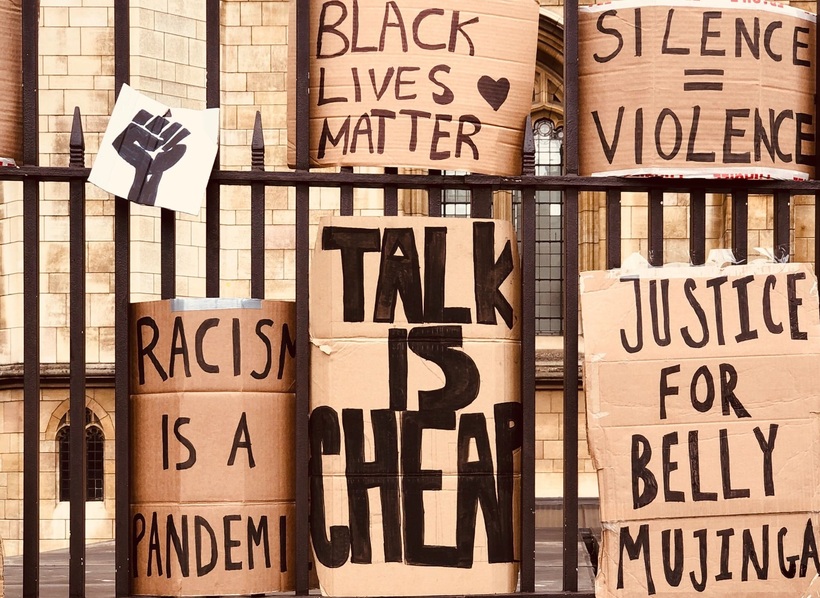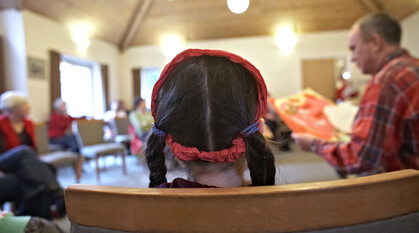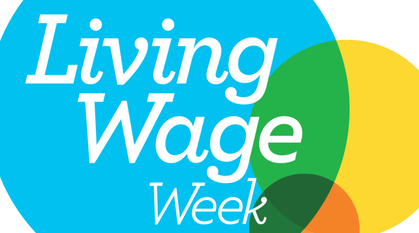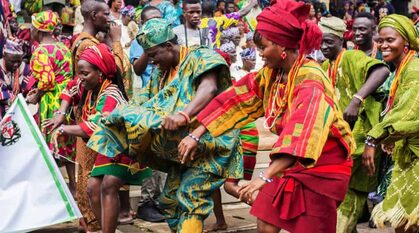The system isn't broken – it was built this way
Quakers need to challenge themselves to dismantle their own prejudices and become anti-racist in word and deed, say Quakers Sophie Bevan and Elliott Burcham.

Last weekend marked a turning point in British race relations. The controversial statue of Edward Colston was dumped in Bristol harbour, finally toppled at a Black Lives Matter demonstration. It was met with scorn from British newspapers, citing the age and expense of the statue as reasons for it to be reinstated, which reflects a deeper concern for property than for the oppression of black people in Britain.
Responses and silences within and beyond the Quaker community have left us wondering:
- Do we as Quakers feel this is the first of many racially insensitive symbols that should fall? Or does the historic value of the statue outweigh the discomfort it causes to many?
- How do we uphold those who are fighting against injustice, even if we do not understand or experience the injustice they feel?
- How do we develop an understanding of other cultures and peoples, without forcing those people to advocate for themselves?
[QUOTE-START]
Do you welcome the diversity of culture, language and expressions of faith in our yearly meeting and in the world community of Friends? Seek to increase your understanding and to gain from this rich heritage and wide range of spiritual insights.
- Advices & queries 16
[QUOTE-END]
As Quakers we need to take the difficult first step in acknowledging our individual prejudices, as well as those of our faith group.
The struggle for racial equality
Curriculums in schools across Britain include the subject of slavery. This typically focuses on the role of the United States of America rather than that of the British Empire. Similarly, we are more likely to learn about the US Black Freedom Struggle than we are about the struggle for racial equality in the UK.
The reality is that Britain has a long history of colonialism, was instrumental in the enslavement of Africans and continues to be an imperialist power. Yet our education systems have taught us to locate the problem everywhere but our nation.
This contributes to the current context where we are able to consider the shocking expression of racism in the USA without also contemplating its presence in the Grenfell tower disaster, the Windrush scandal or the death of Mark Duggan. The fact that the day after perhaps the largest global human rights protest in history, the front page of most national newspapers was an update on a 13-year hunt for a missing white child is a demonstration of the higher value we place on white lives.
No neutral space
As Quakers we are a predominantly white and progressive group that are well versed in the practices of social justice seeking. We can be quick to call attention to the contribution of the media or the police to systemic racism, without thinking of our own involvement. Perhaps reading this you are thinking "but I'm not racist and neither are the Quakers". However, there is no neutral space with racism, we cannot be 'not racist', we can only be complicit in racism or actively against racism. The impact of racism is not always as explicit or intentional as the physical violence inflicted upon George Floyd. Racism can also be implicit and unintentional.
An example of this is the insistence that 'all lives matter' in response to the Black Lives Matter movement. Saying "all lives matter" maintains the status quo by silencing the conversation about the systemic injustice plaguing the black community. While we may be against racism it is these unintentional acts that contribute to the perpetuation of a system that disproportionately benefits whiteness.
Taking sustained action
What can we as Quakers do? We can start by listening with a view to better understanding the numerous struggles that black people face. Reaching out to speak to people within the black community and respectfully embracing the different aspects of black culture. Recognising that while it is important to listen, we have to be mindful when asking black people to do the work for the white community or to explain themselves repeatedly.
There are abundant resources from black educators and people doing anti-racist work, from factual accounts by Akala and Reni Eddo-Lodge to works of fiction like The Hate U Give. Whilst educating ourselves it can be helpful to focus on UK-based resources as differences in historical context impact how racism manifests itself in the UK.
Two hundred years ago, Quakers recognised that it was not enough to reject owning slaves themselves; they had to attack the whole system of enslavement. This required sustained action and an overt stance of anti-slavery against a powerful status quo.
As Quakers today we must not become complacent because of the achievements of our forebears. We must take a stance of anti-racism and help dismantle a system of power that perpetuates violence and oppression towards black people. This challenge will once again take sustained action, in which we as individuals and as a community must get uncomfortable with ourselves – and stay there.


